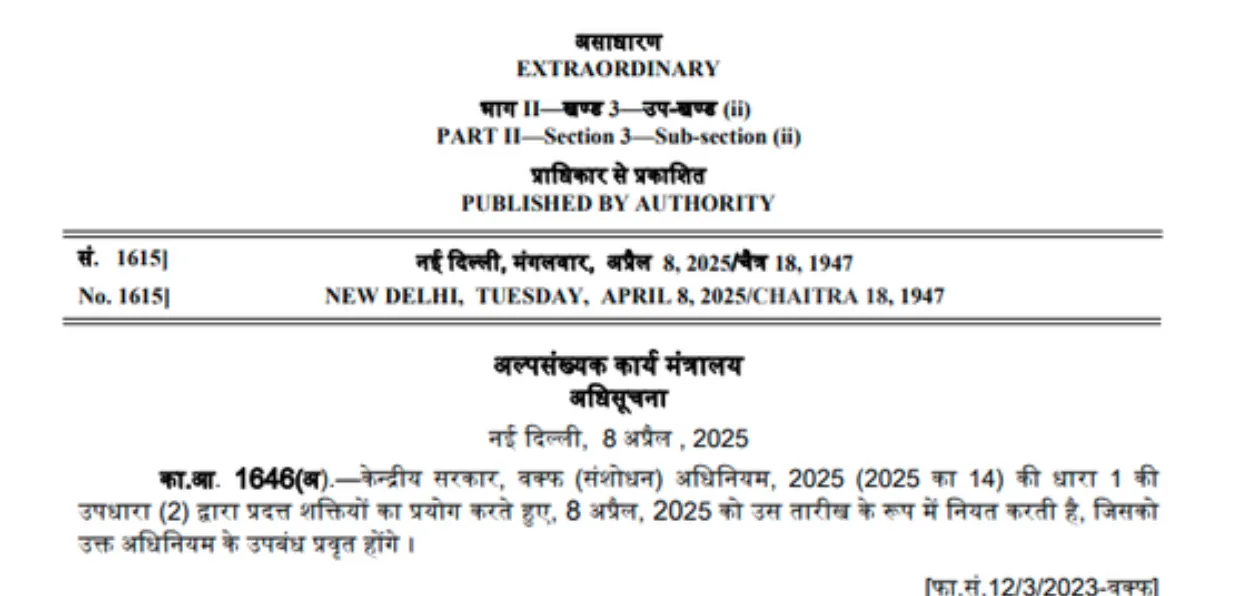
New Delhi
The Waqf (Amendment) Act, 2025, officially came into effect on Tuesday following a Gazette notification issued by the Central Government.
The Act received the assent of President Droupadi Murmu on Sunday, two days after its passage in Parliament.
“In exercise of the powers conferred by sub-section (2) of section 1 of the Waqf (Amendment) Act, 2025 (14 of 2025), the Central Government hereby appoints the 8th day of April, 2025 as the date on which the provisions of the said Act shall come into force,” read the official notification published in the Gazette of India.
In a related development, the Union government has filed a caveat in the Supreme Court in response to the petitions seeking a stay on the implementation of the Waqf (Amendment) Act, 2025.
A caveat serves as a notice submitted to a court by a party to a litigation who wishes to be heard in case any stay order is likely to be issued on the opponent's plea.
The legislation, which amends key provisions of the original Waqf Act, has introduced a series of significant reforms. These include separation of trusts from Waqf entities; introduction of digital and technological tools for property management; creation of a centralised online portal for better transparency; restriction of Waqf property dedication to practicing Muslims only; protection of 'Waqf by User' properties, historically used by the community; recognition of women's rights in family Waqf, etc.
The Bill was passed in the Rajya Sabha in the early hours of Friday, April 4, following a marathon 17-hour debate. The Lok Sabha had cleared the Bill earlier in the week.
Prime Minister Narendra Modi described the passage of the legislation as a "watershed moment" in India's efforts to reform and modernise the management of Waqf properties.
According to the government, the amended Act aims to bring transparency and accountability in the administration of Waqf properties and ensure equitable representation of all Muslim communities in the functioning of Waqf Boards.
However, the law has sparked pposition from several political parties. Opposition leaders have accused the government of using the legislation to further a polarising agenda.
In response to the Act’s implementation, multiple Public Interest Litigations (PILs) have been filed in the Supreme Court challenging its constitutional validity.
Multiple petitions have been filed before the apex court challenging the constitutional validity of the amendments introduced in the Waqf Act, 1995.
After the Waqf (Amendment) Bill was passed in both Houses of Parliament, the Congress announced that it will challenge the legislation before the Supreme Court, claiming that it was an attack on the basic structure of the Constitution and was aimed at “polarising” and "dividing" the country on the basis of religion.
In his petition in the apex court, Congress MP and party whip in the Lok Sabha, Mohammad Jawed contended that the amendments violated Articles 14 (right to equality), 25 (freedom to practice and propagate religion), 26 (freedom of religious denominations to manage their religious affairs), 29 (minority rights), and 300A (right to property) of the Constitution.
Several others, including All India Majlis-e-Ittehadul Muslimeen (AIMIM) chief Asaduddin Owaisi, the Association for Protection of Civil Rights, AAP leader Amanatullah Khan, Maulana Arshad Madani of Jamiat Ulema-i-Hind, All India Muslim Personal Law Board (AIMPLB), Social Democratic Party of India (SDPI), Indian Union Muslim League, Tayyab Khan Salmani and Anjum Kadari, have filed the petitions challenging the constitutional validity of the Waqf (Amendment) Act, 2025.
A day earlier, Chief Justice of India (CJI), Sanjiv Khanna was urged to ensure urgent listing of the matter.
CJI Khanna had assured senior advocate Kapil Sibal that the pleas against the Waqf (Amendment) Act, 2025 would be listed for urgent hearing.
"I will get the (urgent mentioning) letter and do the needful this afternoon," the CJI told Sibal.
As per the computerised case status, the plea filed by Owaisi, and the batch of petitions, is tentatively listed for hearing on April 15/16.
ALSO READ: Waqf properties could generate Rs 1.25 lakh crore income: claims book
The concept of ‘Waqf’, rooted in Islamic laws and traditions, refers to an endowment made by a Muslim for charitable or religious purposes, such as mosques, schools, hospitals, or other public institutions.
